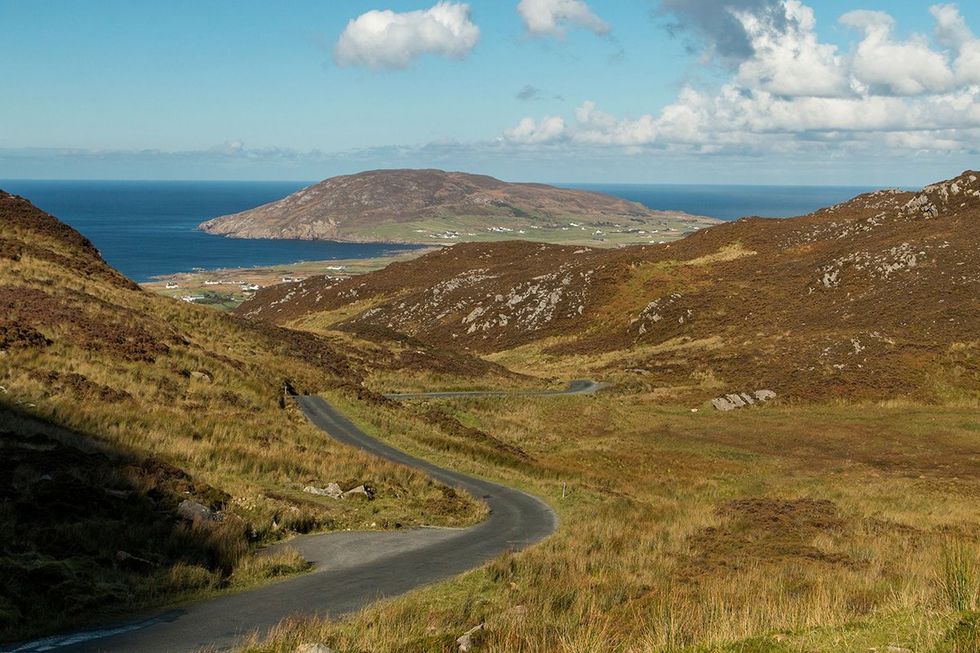All Rights reserved
By continuing to use our site, you agree to our Privacy Policy and Terms of Use.
By Yolanda Evans, CNN
(CNN) – Donegal is Ireland’s most northerly county, where you’ll find spectacular sea cliffs, rugged mountains, and secluded beaches. And at the top of this county is Inishowen, Ireland’s largest peninsula.
The area has a lot to offer for any travelers venturing to these northwest reaches. There’s Doagh Famine Village, where visitors can learn about Irish daily life from the 1840s to the present day or, if the timing is right, there’s a chance to see the Northern Lights.
Malin Head, the country’s most northerly point, is a popular landmark offering stunning views, while Glendowen Craft Shop in nearby Clonmany sells tweed garments and accessories that make perfect souvenirs. The Urris valley has some of Ireland’s best hillwalking at Lenan Beach and Tullagh Bay Beach, which is also a great place to surf.
Back in the 19th century, however, this county was at the center of an illegal trade in poitín – or Irish moonshine. Inishowen in particular was such a hive of illegal activity that the area was jokingly referred to as the Urris Poitín Republic.
When people think about Ireland and hard alcohol, they immediately think of whiskey. But poitín – pronounced “potcheen” – is Irish whiskey’s much older country cousin. There isn’t much documentation when it comes to liquor distilled in pots in rural homes from a mash of cereal, grain, and often potatoes, but some claims date it as far back as the first century, which would make it one of the most ancient spirits in the world, if not the oldest.
‘Water of life’
Its nicknames include “mountain dew” – (yes, the soda shares its name with moonshine slang) – and uisce beatha, or “water of life,” which is also used as a term for whiskey.
During the 17th century, when Ireland was under British rule, the authorities tried to regulate poitín-making and introduce taxation. It wasn’t an easy task to collect taxes from rural producers who’d been brewing unhindered for centuries, so the spirit was made illegal in 1661.
Instead of disappearing, poitín-brewing went underground, and the black market flourished. There are countless stories of the distillers, their craft, and antics. One tale often retold in northwest Ireland today is that of the island of Innis Murray, off the Sligo coast, which was declared a kingdom by Martin Hegarty and turned into an outlaw distillery.
The wily rural distiller was a tricky individual to capture and he and his associates largely worked undercover of night, making it even harder for them to be caught in the act. Rewards were offered to those who might report their neighbors, but that also was of little efficacy. So it was that communities became targeted as a whole.
Short-lived ‘republic’
“The authorities had to work out a way they could recoup their taxes and also eradicate the illegal distillation,” says Jennifer McLaughlin-Doherty, founder of Irish Ancestral Tours and Research, who grew up in Urris and has a close connection with the short-lived era of the Poitín Republic of Urris.
“They decided to fine the entire townlands instead of fines for an individual. And that meant even if you weren’t producing, you had to pay. And when that didn’t work, they started to levy the fees to the landlords. So, the landlords then became responsible for policing.”
Geographical isolation was Urris’ super-strength. On its western side, it’s sheltered by a harbor. Then it was shielded by the Croagh Carragh, Mamore, and Raghtin More mountains that all but sever the entire area from the mainland. The only point of entry was through the Mamore Gap, a narrow pass between two cliffs.
Fed up with the heavy fines, the people of Urris declared themselves the independent nation of the “Urris Republic of Poitín” and sealed themselves in by collapsing the pass in 1812, McLaughlin-Doherty explains.

The narrow pathway was useful for ambushing the police or military who tried to stop their illegal activities. They also gave refuge to people from other areas who had been caught for distilling. The townspeople were able to be self-sufficient because of their farmlands and fishing, thus allowing the Urris Republic of Poitín to last for three years before the coup was ended in 1815.
“My grandmother told me that her grandmother told her a story to her when she was very young of red coats, British red coats streaming down the hills as if, like a sea of blood,” says McLaughlin-Doherty. “Arrests were made and stills were seized when they finally broke the republic. And that was the end of that. They had a local battalion, but the military was stationed locally to keep the order.”
An unfortunate legacy
Even with the end of the Republic of Urris, that still didn’t stop the making of poitín. Unregulated brewing and consumption is a dangerous practice and lives were ruined both through the social problems it creates and health risks such as methanol blindness.
The Catholic Church, a stronghold in Ireland, was instrumental in the eventual curbing of illegal poitín production.
“It just devastated this community,” says Pat Doherty, owner of Doagh Famine Village. “There are no good stories about poitín as that broke up families. The church got involved with the government and they said it was an immortal sin to have anything to do with poitin. It’s hard to believe, but that seemed to work.”
By the late 20th century, Ireland had slowly started to embrace its complicated history with its oldest spirit. The first step was permitting legally distilled poitín intended for expert to be produced. It was sold and stocked in duty-free stores at Ireland’s Shannon and Dublin airports from 1971.
The drink finally became legally available on the Irish home market in 1997, putting an end to the 336-year ban. In 2008, poitín was awarded an EU geographical indication, meaning it can only be produced in Ireland, giving a new boost to the spirit.
Poitín in modern Ireland
“Poitín is a small but growing industry in Ireland, stimulated and driven by enthusiasts which is gaining a growing reputation by the year,” says Aengus King, director of the Drinks Ireland business group. Its geographical indication status means that “to be an authentic poitín product, it must be distilled and produced to specifications laid down in a file, chief of which is that authentic poitín can only be made on the island of Ireland using traditional methods and ingredients.”
Even after the ban was lifted, it took 20 years for distilleries to embrace this forgotten spirit due to its outlaw reputation. The initial licensing requirements are the same as for making any other spirit in Ireland and there are additional requirements, as poitín is a protected spirit category.
“After obtaining a distillery license from the tax authorities it is mandatory to get approval as a poitín production facility,” says Pádraic Ó Griallais, founder and director at Micil Distillery in Galway. “The Revenue Commissioners and the Department of Agriculture share this responsibility. It must be made predominantly from grain/cereal. There are detailed, specific rules that make sure the category is produced traditionally.”
It’s a far cry from the drink’s unregulated origins.
In modern-day Ireland, poitín is having something of a renaissance with the spirit as a popular ingredient in cocktails where consumers want an Irish twist on an original. Poitin has come a long way, but even now with it being legal, this still has not stopped some folks distilling the spirit at home.
“I believe making it illicitly is a dying practice,” says Ó Griallais. “As for why those who continue it, there is a number of reasons. We love being a bit irreverent in Ireland. As poitín-making was originally outlawed while Britain was in power, making it almost feels liberating for some of the illicit makers. It is an old kind of social justice that has continued in the form of distilling.”
The-CNN-Wire
™ & © 2024 Cable News Network, Inc., a Warner Bros. Discovery Company. All rights reserved.












































































